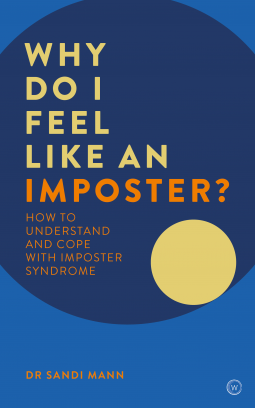
Why Do I Feel Like an Imposter?
How to Understand and Cope with Imposter Syndrome
by Dr. Sandi Mann
This title was previously available on NetGalley and is now archived.
Send NetGalley books directly to your Kindle or Kindle app
1
To read on a Kindle or Kindle app, please add kindle@netgalley.com as an approved email address to receive files in your Amazon account. Click here for step-by-step instructions.
2
Also find your Kindle email address within your Amazon account, and enter it here.
Pub Date 10 Sep 2019 | Archive Date 8 Oct 2019
Watkins | Watkins Publishing
Talking about this book? Use #WhyDoIfeelLikeAnImposter #NetGalley. More hashtag tips!
Description
All of us, at one point or another, have questioned our capabilities and competence. Maybe you've wondered how you got hired and, handed big job responsibilities? One recent article suggested that 70% of people will experience at least one episode of IS in their lives.
Imposter Syndrome (also known as imposter phenomenon, fraud syndrome, or the imposter experience) is a concept describing individuals who are marked by an inability to internalize their accomplishments and a persistent fear of being exposed as a ‘fraud’. The term was coined in 1978 by clinical psychologists Pauline R. Clance and Suzanne A. Imes. Despite external evidence of their competence, those exhibiting the syndrome remain convinced that they are frauds and do not deserve the success they have achieved. Proof of success is dismissed as luck, timing, or as a result of deceiving others into thinking they are more intelligent and competent than they believe themselves to be.
This book presents an accessible and engaging examination of IS and how it affects us—not just at work, but as teenagers, parents and beyond. Using interactive quizzes to help you identify if you suffer and offering tips and tools to overcome your insecurities, psychologist Dr Sandi Mann will draw on her experience not only as an academic, but also as a practitioner, to present a comprehensive guide to understanding and overcoming IS.
Available Editions
| EDITION | Other Format |
| ISBN | 9781786782182 |
| PRICE | $14.95 (USD) |
| PAGES | 184 |
Average rating from 16 members
Featured Reviews
Imposter syndrome is something that impacts so many of us nowadays especially when we live in such a fast-paced, Instagram filtered world. This book explores what imposter syndrome is, why so many of us experience imposter syndrome, and also the different forms that imposter syndrome can take. This is a really insightful read and I would recommend it to anyone who has experience of imposter syndrome.
 catherine h, Reviewer
catherine h, Reviewer
I blame our parents, relatives and teachers. They always made us feel worthless, dumb, and small and held up others as being so much smarter. I have often felt like this and have even made Dean's List in college! My first academic job, I was actually asked by an aunt "Are you smart enough to work there?" Still feel like I'm faking it after 30 years in my field. I am grateful I've never been caught out and am close to retiring. All the brilliant people on this plant likely feel like frauds. Sad so many of us feel like this. I'm sure it has had a profound effect on humanity's future. How much better of a world it would be if everyone's self esteem was higher and we felt more confident.
I've been waiting for this book for a long time. Sorry it was a bit late for me and my career, but I certainly hope it finds it's way into younger hands.
I believe each of us has experienced the feeling of imposter syndrome at one time or another in our lives and careers. Starting in school, we are graded against one another and compared to each other, so no wonder we often feel we don't measure up.
Why Do I Feel Like an Imposter? How to Understand and Cope with Imposter Syndrome by Dr. Sandi Mann is an excellent resource book that explains the syndrome, offers several helpful self-assessment quizzes and provides excellent case studies. Dr. Mann's tips for recognizing and overcoming imposter syndrome are practical.
I liked how the author looked at various forms of imposter syndrome: men, women, parents, teens, and students.
The information presented is helpful and a good resource to have on hand. I would recommend this book.
Helpful & Insightful
This book is a necessary read for anyone who suffers from Imposter Syndrome (IS) or has a loved one who deals with it. Before this book, I had no idea 70% of us have this issue. I thought it was like the 1% Clearly, everyone is ridiculously good at faking or hiding it!
After reading a book, Burnout: The Secret to Unlocking the Stress Cycle on a similar subject, I had this thought that there are probably those who are more likely to experience burn-out simply because they didn't like their job but for no other reason than they felt they weren't good for it. So the constant 'trying too hard' and working harder, to prevent getting exposed as a 'fake', was getting to them. That is no way to live! Yet, for someone with IS, it's the only way to survive. The only way to keep our reputations intact, our means of income steady, and our lives stable.
I've been there: wishing classes were cancelled because I couldn't stand another day of 'faking it'. Even if I understood the work, or was doing well, I would attribute it to something or someone else. If this sounds like you, or someone you know, this book would be most beneficial.
From Dr. Sandi Mann's neatly condensed book, you'll learn how best to minimise the symptoms of IS from taking over your life. I had no idea this was possible! IS taints everything, dents your success, happiness and accomplishments. It gets in the way but there are ways to give yourself a much-needed 'reality check'. It's not true, the stuff it tells you, it limits you. (I need to remind myself of this too!) We need to own our good moments, and keep the bad stuff from ruining them.
IS is something that lingers. It's either always present or in the background. Dr. Mann offers a thorough guide to understanding and identifying its characteristics in individuals. There are different types of 'Imposters': the perfectionist, the striving parent, the high-achieving student, the self-employed entrepreneur, the devout religious leader etc.... We, 'imposters', are everywhere.
From the beginning, I thought that the people who didn't know IS was a 'thing' are truly missing out. Their lives are also worse for it. All imposters have contemplated quitting the source of their misery. Or, refusing that promotion or salary bonus. Most of us don't act on these beliefs- we know where they come from. But those who don't? They'll quit and never fulfil their potential.
This book raises awareness and understanding massively: it answers questions I didn't know I had.
I recommend!
--
I received this book through NetGalley for review consideration. All opinions are honest and completely my own.
 Reviewer 527051
Reviewer 527051
As an online business owner who hears about Impostor Syndrome a lot in the online space but hasn’t ever identified with it personally, I was intrigued to read this. Turns out my perfectionism is a form of IS! Fascinating read, easy to understand and relatable. The quizzes were really valuable early on as you are then drawn in to understand more about yourself.
 Elizabeth S, Reviewer
Elizabeth S, Reviewer
Have you ever had a small voice inside you telling you that a recent success was down to luck rather than hard work? Have you ever felt nervous that someone else is going to find out you that you have no idea what you're doing? Then you could have experiences Imposter Syndrome; personally, I've mainly felt this way in my work place and while that's common there are so many other angles I hadn't considered, particularly around a male experience as well parenthood.
This is a great guide to something that affects so many people, whether you feel like this aligns to you, someone you know or if you've been cheerfully oblivious to the fact that some people live part or all of their lives feeling like 'frauds' then I think there's something to be gained from this book. It includes quizzes to help separate the core different variations and if you think you align to one or more it even has suggestions for how to start overcoming those feelings.
 Reviewer 574867
Reviewer 574867
"Why Do I Feel Like An Impostor? How to Understand and Cope With the Impostor Syndrome" by Dr. Sandi Mann is a well written guide to help any person or professional that may have felt incompetent or unsure about themselves, despite the years of training, the competencies, and degrees earned. A study has shown that over 70% of us probably suffer from Impostor Syndrome (IS), where you may believe that you are inappropriately claiming to be somebody you are not despite all the appropriate training, education, license, and competency. It is a condition that can be debilitating and affects our ability to confidently perform our roles in relationships, our jobs, or our professions. It can also affect ones ability to be a better parent or role in any relationship.
Dr. Sandi Mann is an expert in this field as a chartered academic psychologist and a senior psychology lecturer teaching clinical applied psychology. Dr. Mann also specializes in conditions such as anxiety, depression, phobias, panic attacks, trauma, obsessive compulsive disorder to name a few. The first couple of chapters explains the Impostor Syndrome with quizzes and assessments. the next 5 chapters goes over how the Impostor Syndrome is experienced by different groups of people such as(1) women in the work force, (2) male stereotypes, (3) imposters outside the work force such as the do-gooders or those that keep up appearances of a perfect life, (4) perfect parents, and (5) Student pressures. Each of the chapters are further explained through case studies to help with real life scenarios followed by tips to work through those feelings or syndrome. I love that the strategies are presented to help manage Impostor Syndrome and feel the success, gain confidence and diminish insecurities.
Overall, I highly recommend this book for anyone that may have these feelings fulfilling their role in their personal relationships and also in their professional life. This is a good reference and an excellent read written very clearly with real life strategies to help with this issue.
Thank you to NetGalley, Watkins Publishing and the author for an advanced readers copy of this ebook for honest and objective review.
Readers who liked this book also liked:
We Are Bookish
General Fiction (Adult), Romance, Women's Fiction


















